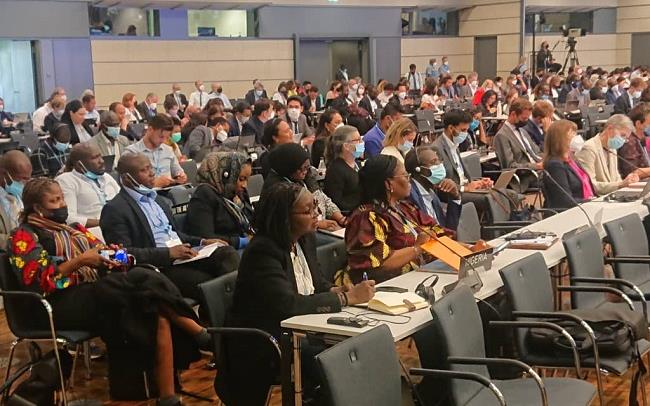The critical role of technology in reducing greenhouse gas emissions and building resilience to the impacts of climate change was highlighted at the UN Climate Change Conference in Bonn in June 2022.

Two topics of particular importance were: how to provide technical support to developing countries in implementing their national climate action plans (NDCs); and how to bolster technologies for strengthening coastal and ocean adaptation, such as early warning systems. Both topics are crucial to help achieve the goals of the Paris Agreement and the Sustainable Development Goals (SDGs).
“Technology gives the world what is possible to help NDCs be more ambitious,” saidAmbrosio Yobanolo de Real of Chile, Chair of the Technology Executive Committee (TEC) at an event on technology’s role in constructing more ambitious NDCs.
Omedi Moses Jura, chair of the Climate Technology Centre and Network (CTCN) Advisory Board, offered an overview of the key findings of a new TEC-CTCN joint publication including how to overcome technical, financial and institutional challenges related to the uptake of technologies. The TEC and the CTCN will update the joint publication next year.
Kudzai Ndidzano, Deputy Director of Climate Change Management Department, Ministry of Environment, Climate, Tourism & Hospitality, Zimbabwe, presented a recently completed CTCN technical assistance project of developing circular economy roadmaps for reducing greenhouse gas emissions from the waste sector in Zimbabwe, formulating waste targets for both the mitigation and adaptation components of their revised NDC. The inclusion of waste targets from the roadmap led to a 7% improvement in the overall emission reduction target of Zimbabwe’s revised NDC.
Estefanía Ardila Robles, Deputy Director of Country Engagement, NDC Partnership, pointed out the global implementation gap stemming from the low level of technology adoption and deployment. International collaboration, such as that provided by the NDC Partnership, plays an important role in bridging that gap by bringing together developed and developing countries as well as institutional members to create and deliver on ambitious NDCs.
Responding to urgent needs identified by member countries, for example, the NDC Partnership looks to immediately deploy economic advisors to support the preparation of climate compatible recovery packages.
Building resilience through technology and nature-based solutions
To address the progressive impacts of climate change, there is an urgent need to adopt innovative approaches that integrate both technology and nature to enhance the resilience of coastal and ocean-dependent communities.
During the Ocean and climate change dialogue at the Bonn Conference, the TEC Chair, Ambrosio Yobanolo de Real, launched a joint policy brief that contains recommendations on how to scale up approaches that combine technology with nature-based solutions.
“Approaches that integrate both technology and nature-based solutions offer potential to be more robust and cost-effective than one solution alone. These solutions include early warning systems and hybrid approaches to reduce the impacts of storm surges and sea level rise,” he said.
One example featured in the publication is the Resilient Fishing initiative in Peru, which works to implement selective fishing techniques and improve fishing gear, reducing vulnerability and enhancing the resilience of small-scale fisheries while strengthening ancestral knowledge in combination with modern technological systems such as early warning systems for flooding and harmful algal blooms.
A further example is the “Rebuild by Design” design competition model, which has produced innovative hybrid adaptation solutions, such as a series of offshore “living breakwaters” on the southeast shoreline of Staten Island, New York, that provide habitat for marine life while providing a buffer against wave damage, flooding and erosion.
Conceived as part of the Hurricane Sandy recovery, this initiative has been replicated internationally by the United States Agency for International Development (USAID), the Swedish International Development Cooperation Agency (SIDA) and The Rockefeller Foundation, developing the Global Resilience Partnership.
